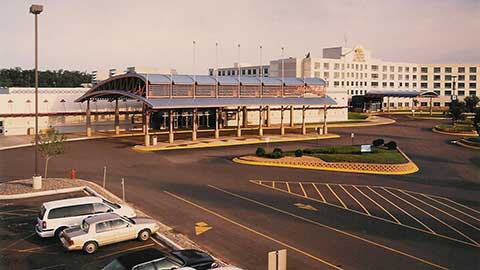Good Neighbors
Good Neighbors
Since opening Grand Casino Mille Lacs and Grand Casino Hinckley in 1991 and 1992, the Mille Lacs Band has become Minnesota’s 40th largest employer, employing more than 4,100 people — 90 percent of whom live in surrounding East Central Minnesota communities.
The Mille Lacs Band owns and operates nearly 30 businesses, and in addition to providing critical employment opportunities, the Band and its businesses are collectively the largest taxpayer in Pine County and one of the largest taxpayers in Mille Lacs County.
Economic Impact
In addition to 3,400 corporate employees, the Band’s government employs approximately 700 people full-time. More than 90 percent of employees live in surrounding communities. The Band is also a significant provider of health insurance and other benefits to people in the region.
The Mille Lacs Band supports local small businesses, with a majority of the vendors and local contractors located in East Central Minnesota. Neighboring local businesses have created many new jobs in response to increased visitor traffic created by Grand Casino Mille Lacs and Grand Casino Hinckley and increased spending by casino employees. Since the casinos opened, jobs have increased by 35 percent in Mille Lacs County and 72 percent in Pine County.
Local hospitals have expanded, in part because Grand Casino Mille Lacs provides health insurance benefits to area residents who may not have had insurance before. Local utilities have increased their power output to accommodate the casinos’ electrical needs. Grand Casino Mille Lacs and Grand Casino Hinckley paid approximately $5.6 million for utilities in 2010.
The Band has invested in community infrastructure, economic development, and other benefits for the entire region and is an important economic catalyst throughout East Central Minnesota.
Taxes
American Indians pay federal income tax on all of their income, and most pay state income taxes. The only exceptions are American Indians who live and work on the reservation – they do not pay state income taxes. In addition, people who live on trust lands do not pay real estate taxes, because they lease rather than own the property.
While lands owned by the United States in trust for tribes, including certain Mille Lacs Band lands, are not subject to state and local taxes, the Band does pay real estate taxes on all lands it owns. In 2010, the Mille Lacs Band, Mille Lacs Corporate Ventures, and Grand Casino Mille Lacs paid $454,389 in property taxes to Mille Lacs County, $1,118,884 to Pine County and $102,706 to Aitkin County.
Grand Casino Mille Lacs and Grand Casino Hinckley have paid more than $86 million in federal and state taxes based on wages paid to employees since 1991. In addition, the Band shares sales, liquor, cigarette, gas, motor vehicle, and other taxes collected on reservation trust lands with the State of Minnesota, which in turn shares those taxes with local governments. In 2011, the State’s share of sales taxes collected by the Band at its businesses was almost $1.1 million.
Tribal casino profits are exempt from county, state and federal taxes because they are tribal government operations, not private, for-profit businesses. Just as state lottery revenues are reserved for use by the state, tribal gaming revenues are reserved for use by the tribes.
Charitable Contributions
Due to the success of its business enterprises, the Mille Lacs Band is also able to participate in charitable giving opportunities. Each year the Mille Lacs Band and its businesses donate to charitable causes and community initiatives in Minnesota. In recent years the Band has donated millions of dollars to charitable causes like law enforcement agencies, educational institutions, hospitals, food shelves, and other organizations and projects that benefit the entire state.
Inter-governmental cooperation
While it is a sovereign nation, the Mille Lacs Band tribal government works closely in partnership with the State of Minnesota and local governments in a number of key areas. The Mille Lacs Band Department of Natural Resources works in partnership with the Minnesota DNR to co-manage the fish population in Mille Lacs Lake. The two departments work together to survey the fish population, determine an annual safe harvest limit to protect the walleye, and coordinate efforts to fight aquatic invasive species (AIS) and enforce regulations.
For 25 years, the Mille Lacs Band Tribal Police Department operated under a cooperative joint services agreement with the Mille Lacs County Sheriff’s Department, allowing the departments to assist one another in community policing and extending the county’s 911 dispatch services to include the Mille Lacs Reservation and the Tribal Police Department. Mille Lacs County revoked the agreement in 2016.
Cultural Diversity
The Mille Lacs Band’s culture has enriched the East Central region since before the founding of Minnesota, and we continue to share our cultural and historical legacies with the citizens of the region and the state.
In cooperation with the Minnesota Historical Society, the Mille Lacs Band operates the Mille Lacs Indian Museum and Trading Post, which includes a museum dedicated to telling the story of the Mille Lacs Band of Ojibwe and a restored 1930s trading post where visitors can find American Indian gifts from Mille Lacs artisans.

